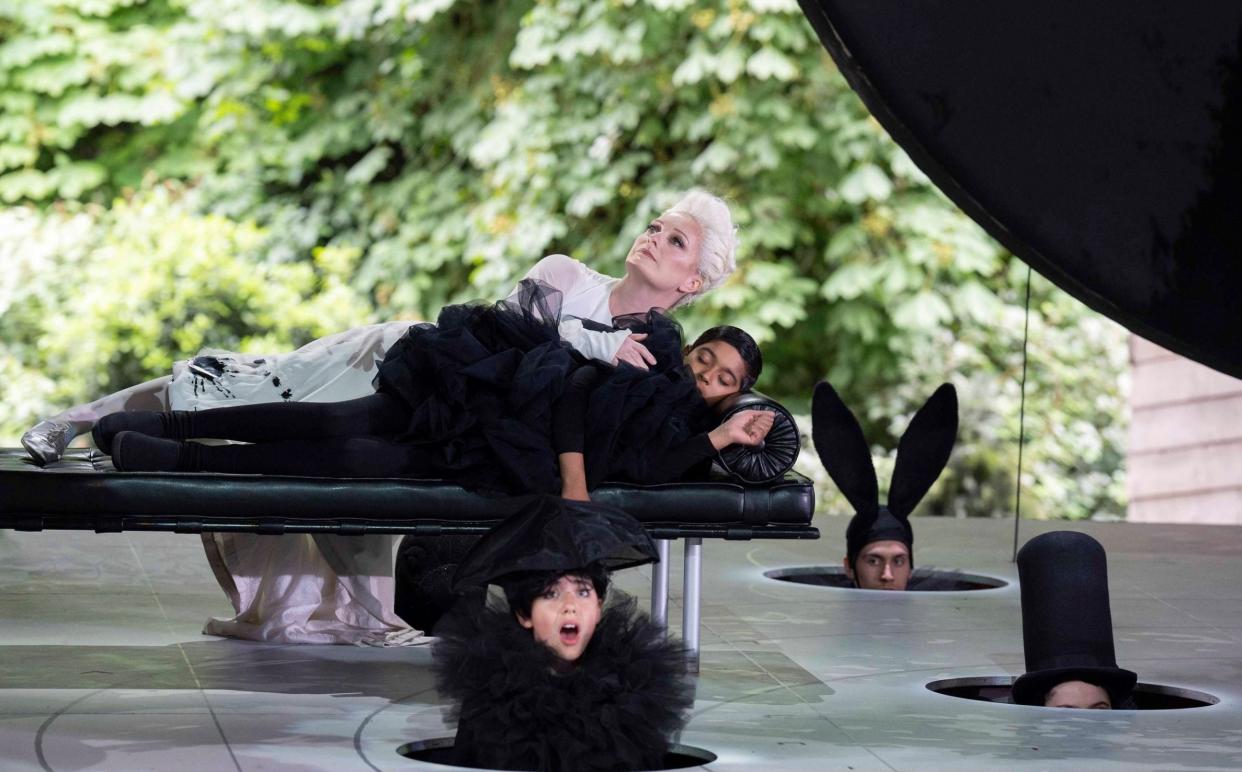Midsummer Night’s Dream, Garsington Opera: A production full of craft but short on warmth

- Oops!Something went wrong.Please try again later.
If ever a spot seemed designed by providence for a production of Britten’s Midsummer Night’s Dream, it is surely Garsington Opera. You could imagine sprites gambolling in the tree-lined hills that surround the glass-and-steel opera house, and Netia Jones, the director and designer of Garsington’s new production actually brings that luxuriant outdoors into her production, by leaving the back wall open so we see the sunlit trees beyond.
But then, for Acts II and III, she shuts them out, to emphasise that this is a dark world, where magic rules – though for me the production is often more obscure than dark. We see centre-stage an oak tree growing through a wrecked piano, one of those bits of director’s symbolism you find yourself pondering when you should be enjoying the opera. At the beginning, we see a swarm of little creatures in black, who turn out to be the little helpers of the Fairy Queen Tytania, whom we witness in a furious quarrel with her husband Oberon, both in black. The four human lovers whom Oberon plays tricks on with his magic love potion appear first in blue, but then at the end, when everyone has been restored to their proper partners, in glowing white.
All this Jungian symbolism of dark and light feels somewhat forced. It’s a shame the sprites played by Garsington Youth Opera Company have to be in black, but on Sunday evening they performed with such grace and sang with such spell-binding accuracy that they charmed us anyway. As for the major roles, Iestyn Davies as Tytania’s husband Oberon brought out all the music’s uncanny lyricism, but there was precious little chemistry between him and Lucy Crowe as Tytania, who hit her top notes with her customary exquisite softness but otherwise seemed curiously disengaged. The later scene where thanks to Oberon’s spiteful love potion she conceives a mad passion for the “rustic”’ Bottom – now magically transformed into an ass – normally gets a few laughs. Here there was barely a titter.
Interestingly, there was a brief spark of erotic chemistry between Davies and Jerone Marsh-Reid, balletically agile as Oberon’s willing helper Puck. It flared up more vigorously between the four young lovers, who spend the night running from the right lover and pursuing the wrong one with deranged fervour. James Newby as Demetrius had the most full-blooded vocal instrument to carry this off convincingly, and if the two women Stephanie Wake-Edwards and Camilla Harris weren’t vocally so strong, their fight was certainly entertaining.
But the productions most satisfying moments came in those scenes where the six rustics rehearse their absurd play about a thwarted marriage. Here, the playfulness of Britten’s (and Shakespeare’s) conception shone out unimpeded. Each character – John Savournin’s pedantic Quince, Adam Sullivan’s slow-witted Snout and above all Richard Burkhard’s big-hearted Bottom – was nicely etched. They provided a few laughs, and also (when Bottom is panic-stricken to find himself alone) some moments of genuine pathos, in a production that overall is subtly crafted but somewhat short on straightforward warmth.
Until July 19; garsingtonopera.org

